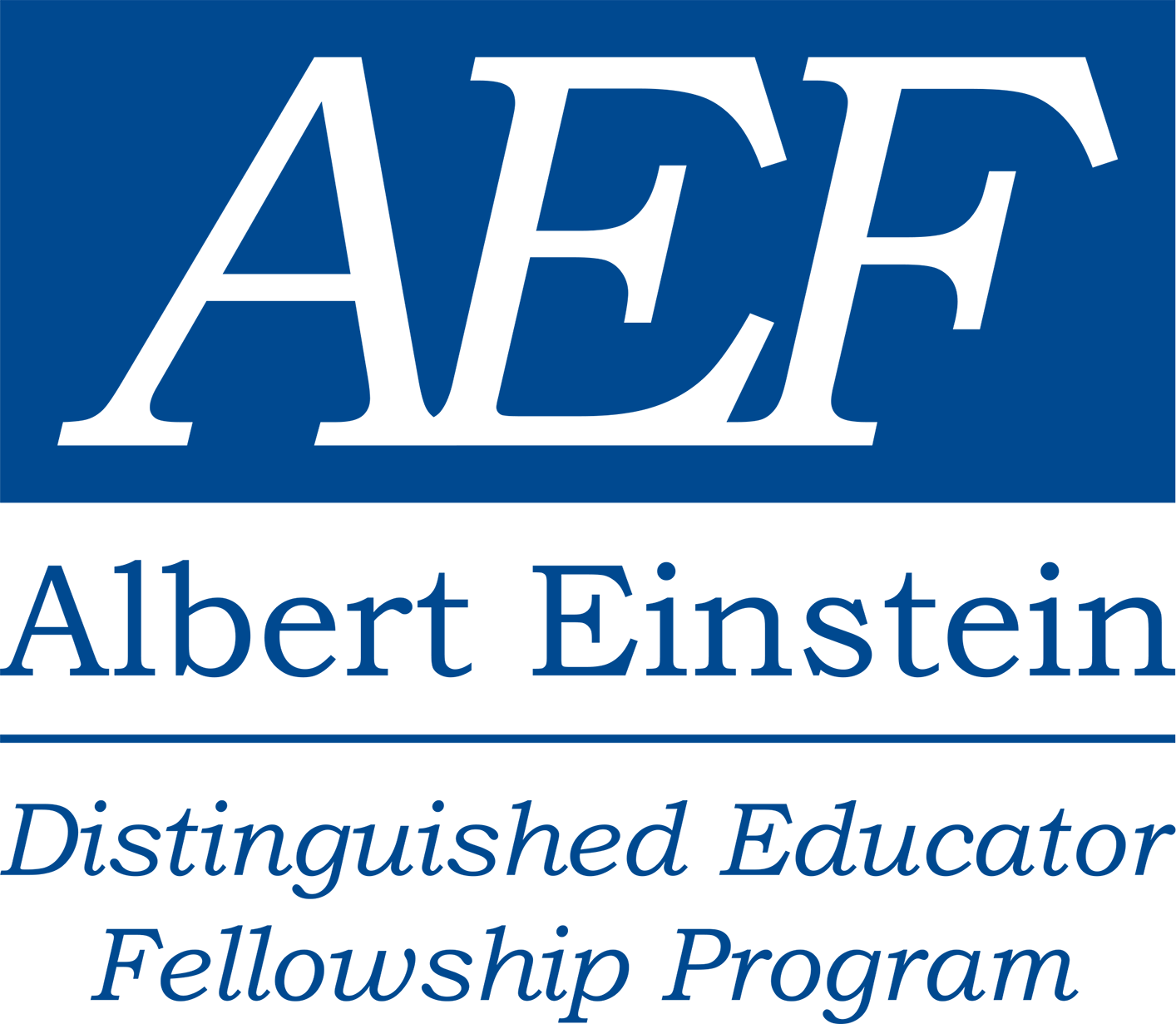Embracing the challenge: Albert Einstein Distinguished Educator Fellows inspire their students and lead by example

The Albert Einstein Distinguished Educator Fellowship (AEF) Program is an 11-month fellowship which allows educators in the fields of science, technology, engineering, and mathematics (STEM) to serve in the national education arena. Throughout the Fellowship, these participants, working in Federal agencies or in U.S. Congressional offices, gain first-hand knowledge and experiences which they then take back to their students.
Three educators currently participating in the AEF Program sat down with Michael Holtz, host of the “ORISE Featurecast,” to discuss their fellowships, their hard work, and everything in between.
Jessica Fries-Gaither is an elementary science specialist who teaches at an all-girls’ school in Columbus, Ohio. As an AEF Fellow, she is placed at the Library of Congress.
“They keep me pretty busy,” she said of her placement. “I'm juggling about five different projects right now, mainly because I can't say no to anything. And so every time there's something interesting, I say, ‘Sure, of course I'll help you out with that.’”
Victoria Miranda Thomson, who usually teaches science in Connecticut, agreed that her Fellowship keeps her busy as well.
“I'm currently placed with the United States Geological Survey (USGS) this year,” she said, “and I have lots of projects happening too. I try to really think about what I'm going to be doing on a national level and then also what's happening with the scientists that are working for USGS back in Connecticut, and how can I make sure that the data that they're collecting is getting into the hands of my students.”
“That's so neat to be able to tie that to your home state,” replied Zach Proffitt, who was co-hosting the podcast. Proffitt is placed at U.S. Department of Energy headquarters in the Workforce Development for Teachers and Scientists office.
Thomson applied to the AEF Program multiple times before becoming a Fellow, and one of her students even helped her study. She described making flashcards about national laboratories and studying them during her lunchroom duties or bathroom supervisor duties, and her student enjoyed quizzing her. When Thomson was accepted into the Program, her student said, “I knew you were going to get it. It's because I helped you with your flashcards during bathroom duty.”
“I always want to lead by example for them,” Thomson explained. “Take risks, make all my flashcards, do the same things.”
Fries-Gaither discussed research findings that showed that since 2017, girls are more interested in science than they have ever been, regardless of their social-economic class or ethnicity. However, despite this interest in science, these girls are also experiencing imposter syndrome.
“There's been this huge decline in confidence starting in fifth grade,” said Fries-Gaither. “One of the most shocking statistics that they found was that many girls, almost half of girls in high school, don't believe they're smart enough for their dream career, even among 4.0 valedictorians.”
Thomson shared how she combats this lack of confidence in her own classroom by humanizing scientists and exposing her students to different STEM careers.
“Harvard creates this series of posters called ‘I Am a Scientist,’” she explained. “It features people, the title of their role, and what they love to do personally. It says, ‘I am an ornithologist, but I love playing video games and cooking soufflés too.’ So, it's making it more human, connecting to the human, even just thinking that these scientists aren't superhuman. They're still human too. And you are human, so you could do that too.”
Thomson continued: “I love the AEF Fellowship because there's so many federal resources and materials that are created that I can then provide to my students, that I didn't even know about. So having access to that, and then as soon as I find out about things, I'm always disseminating them to my department and my district. And just making sure that the materials reach everyone, I think helps to break down some of those barriers.”
Fries-Gaither agreed. “That's something that I've learned a lot about this year,” she said. “I didn't know that the Library of Congress had a whole science lab in the basement called the Preservation Lab. And they do everything from analyzing the inks and the pigments in old documents to conducting tests on any material that would ever come in contact with an artifact. I'm so excited to share that with students to think about, if you love science, but you also love history and arts, and you have an application there for x-ray spectroscopy and all those other things that we learned in college but didn't see the real-world value of.”
All three educators demonstrated a clear passion for their students, sharing stories of connection and helping them find a path to STEM. Proffitt communicated the importance of accepting the AEF Fellowship, so that he could be an example for his students.
“Ultimately the reason why you go for it is to be living the kind of life that your students can reflect from, or reflect off of,” he said. “The whole time you're preaching, ‘be your best self, take the opportunities, embrace the challenge.’”
You can listen to the full episode of the “ORISE Featurecast” here:
Media Contacts
Pam Bonee
Director, Communications
Phone: 865.603.5142
pam.bonee@orau.org
Wendy West
Manager, Communications
Phone: 865.207.7953
wendy.west@orau.org
The Oak Ridge Institute for Science and Education (ORISE) is a U.S. Department of Energy (DOE) asset that is dedicated to enabling critical scientific, research, and health initiatives of the department and its laboratory system by providing world class expertise in STEM workforce development, scientific and technical reviews, and the evaluation of radiation exposure and environmental contamination.
ORISE is managed by ORAU, a 501(c)(3) nonprofit corporation and federal contractor, for DOE’s Office of Science. The single largest supporter of basic research in the physical sciences in the United States, the Office of Science is working to address some of the most pressing challenges of our time. For more information, please visit science.osti.gov.

